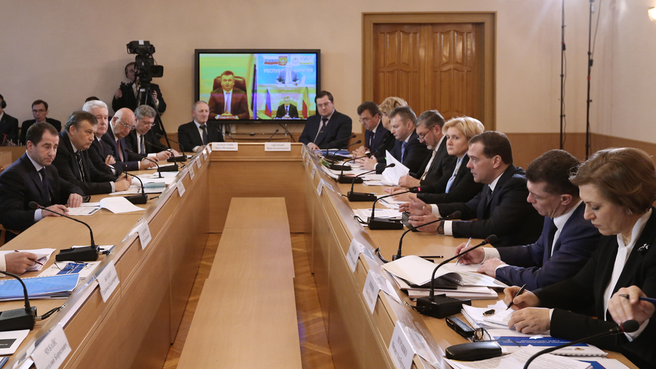Dmitry Medvedev: "Our priority is to ensure the provision of a state-guaranteed amount of healthcare under all circumstances."
Excerpts from Dmitry Medvedev’s opening remarks:
Last week, a government plan for priority measures to ensure sustainable growth of the economy and the social sphere was adopted. Some of the measures concern the healthcare industry.
Our priority is to ensure the provision of a state-guaranteed amount of healthcare under all circumstances. One of our key objectives is to stabilise the pharmaceuticals market. It is crucial to stave off drug shortages and to deal with unreasonable price increases for drugs, especially in the regulated market segment.
It is important to increase the market share of high-quality domestic medicines. We manufacture effective preparations and have modern production processes and consumables in place.
Of course, we will focus on domestic producers, but that does not mean that we will stop importing drugs that are not produced in Russia.
Unfortunately, we are now faced with the rising cost of medicines, which is due to exchange rate fluctuations and plain and simple price gouging. In a number of regions, prices for medicines have increased by over 15 percent. According to experts, prices will grow by about 20 percent in 2015. In any case, oversight in this sphere must be strict.
It is particularly important to prevent unjustified price increases for essential medicines. To this end, we have recently updated the list of essential drugs, which now includes an additional 50 items. We have also prepared an updated shortlist of drugs that any pharmacy network must carry at all times.
There are other important things to keep in mind, such as the fact that we can’t allow low-price drugs to disappear from the pharmacies. We plan to amend legislation, which will provide for a one-off adjustment of prices for the lower and middle value package from the list of essential medicines.
I’m also referring to the possibility of reimbursing the expenses of the budgets of the Russian regions, associated with purchasing foreign-made drugs, medical products and supplies for needy citizens, including those entitled to pharmaceutical benefits. We have reserved fairly significant funds for these purposes. In addition, we will be following the developments in the sphere of the relevant drugs and other medical services.
One other measure of the anti-crisis plan is to create a legal framework for introducing state regulation of prices for medical products that are implanted in the human body. The issue is about the most popular products, such as stents and prosthetic implants used in heart surgery and arthroplasty. I approved such a document by a Government directive of 29 December 2014.
Today, it is important to strengthen oversight over the quality of medical care and its affordability, which also applies to high-tech care. It is imperative to constantly monitor the availability of essential medicines at local pharmacies. Prices must be monitored both in the wholesale sector and pharmacies.












